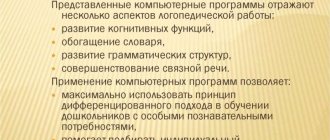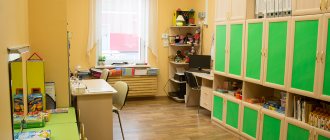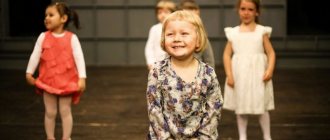Gymnasium s.p. Ali-yurt, Nazran district
Annual report
about the work done by the teacher-speech therapist
Evloeva R.H.
for the 2019-2020 academic year.
The correctional pedagogical activity of the speech therapist was carried out on the basis of the correctional work program, which is part of the structure of the main educational program of the general education organization. Based on this, the main areas of activity of the speech therapist teacher (diagnostic, correctional and developmental, organizational and methodological, advisory, educational and preventive work) were identified and implemented during the school year within the framework of psychological and pedagogical support for children with disabilities studying in an educational organization .
Diagnostic direction of work
As part of this direction, an in-depth study of children entering first grade and students with disabilities was carried out. During the examination, individual characteristics of speech development and the causes of developmental problems were identified, and corrective methods for the upbringing, training and socialization of students with disabilities were determined. Speech therapy examination was carried out in
- September (from September 1 to 15) and the last two weeks of the school year (from May 15 to 31). The primary speech therapy examination made it possible to judge the level of speech development of children and the level at which communicative and regulatory universal actions were formed. Based on the results of the speech therapy examination, the main directions, content and methods of correctional speech therapy work were determined. In the process of providing speech therapy assistance to students with speech disorders, an intermediate speech therapy examination was carried out, which made it possible to adjust the existing individual-oriented program of correctional speech therapy and focus on the most persistent problems of children’s speech development (both in oral and written speech).
Results of a survey of primary school students.
During the period from September 1 to September 15, 2021, an initial speech therapy examination of children admitted to grade 1 (70 children aged 6-7 years) was conducted. The examination was carried out using a test method
“Diagnostics of oral speech of primary schoolchildren”, an album for a speech therapist was used. According to the results of the survey, 59% of children (47 students) correctly pronounced all sounds of the Russian language, had sufficient vocabulary and a well-developed grammatical structure. In 41% of children (33 students), the ability to analyze language phenomena was reduced, sound pronunciation was impaired, phonemic processes were underdeveloped, a poor vocabulary and syntactic structures were revealed, and some children had agrammatism in independent speech.
The speech therapy room primarily included children with disabilities (on the recommendation of the PMPC), and students whose speech impairment may make it difficult to master the general education program. First-graders with problems with the pronunciation of certain sounds were registered or placed on a waiting list, and recommendations were given to parents on how to eliminate defects in sound pronunciation at home.
Information on the presence of children in the first grades with disorders of the sound and semantic aspects of speech by grade is presented in the table.
| Class | Normal speech development | Disadvantages of oral speech | Enrolled in speech therapy room |
| 1 A | 19 | 8 | 6 |
| 1 B | 20 | 7 | 4 |
| 1 V | 11 | 18 | 10 |
The majority of children with speech impairments who entered grade 1 on September 1, 2019 were poorly prepared for school. They had a low level of knowledge and information about the world around them, the children were poorly oriented in space, did not always accurately understand the instructions of an adult, fine motor skills of the hand were not sufficiently developed, and the motivation to learn was extremely low. Children did not know how to generalize, compare, analyze objects and phenomena, could not control their speech, and were uncritical of the shortcomings of their sound pronunciation. First-graders with speech impairments had difficulty composing an independent coherent story. The children's statements were illogical and inconsistent. The children needed the teacher's help. The children's speech was mainly in the form of dialogue. Many sought one-word answers. Children with speech impairments have a reduced ability to analyze linguistic phenomena, and their speech-auditory memory and attention suffer. All of the above complicated the correctional work to overcome speech deficiencies, and led to an increase in the time of correctional work with some children. Parents of first-graders who needed a more thorough examination were recommended to seek advice from a teacher-psychologist at the school and visit specialists at the clinic with their child. Parents whose children did not assimilate the educational program were recommended to undergo a central psychological, medical and pedagogical commission with their children.
The following deficiencies were identified in the written speech of students in grades 2-4:
- reliance on incorrect pronunciation,
- letter replacements corresponding to phonetically similar sounds,
- distorted reproduction of letters in writing,
- replacement and mixing of graphically similar letters,
- incorrect division of sentences into words, which manifests itself in writing as distortions in the structure of words and sentences.
General information about the number of enrolled students, the structure of speech disorders for the 2021-20 academic year.
| Types of violations | |||||
| Systemic speech underdevelopment caused by mental retardation | ONR (general speech underdevelopment) | FFNR (phonetic-phonemic speech underdevelopment) | NPOS (impaired pronunciation of certain sounds) | ||
| Enrolled in speech therapy Classes | 11 | 7 | 4 | 3 | |
Report
1.Report for the period of distance learning.
9 students attended speech therapy classes (remotely).
All children who were recommended for correctional classes have systemic speech underdevelopment.
Children enrolled in speech therapy classes have impairments in phonemic hearing, sound pronunciation, grammatical structure of speech, as well as reading and writing processes. Most of the children have the diagnosis: “Low level of development of all linguistic means (Systemic phonetics - phonemic and lexical - grammatical underdevelopment of speech.) “Several students have the diagnosis: “Low level of formation of linguistic means with a predominant violation of the semantic aspect of speech.”
1. Pronunciation problems in children look like this:
- lambdacism - 4 students:
— rotacism – 3 students:
- sigmatism - 2 students: interaction with all areas is carried out - exercises for fine motor skills.
Conversations were held for parents on the daily routine during holidays and weekends. Individual interviews were carried out to collect anamnesis based on the examination results. Individual consultations were carried out.
Differentiation of sounds. Automation of sounds.
The necessary methodological literature is provided on various types of work with children with speech disorders of varying complexity.
Problem.
1. After the lesson, I ask my parents to record a video with the material that interests me and send it to me. For one girl, we go to pure R, removing T and D before R. During the online class, I heard pure R, and on the recording from my parents I heard the sound of D before R.
nicknames of the educational process. The necessary material has been prepared for their use:
- articulation exercises:
- breathing exercises;
Based on the results of the work, 8 students were graduated with improved standards of oral and written speech. 11 children with disabilities from grades 1–3 were retained to continue speech therapy classes (all on the recommendation of the PMPC).
A digital report is attached.
Correctional and developmental direction
The content of this direction includes the following aspects:
— selection of correctional programs, teaching methods and techniques that are optimal for the development of a child with speech impairments in accordance with his special educational needs;
— organizing and conducting individual and group (subgroup) classes for the correction of oral and written speech disorders, as well as the development of children’s communication skills.
Within the framework of this area of work, correctional and developmental programs were carried out, taking into account the age and developmental characteristics of students, the structure of the defect, as well as providing assistance to the teaching staff in individualizing the development, training and education of children with disabilities.
Based on the results of the speech therapy examination, 4 groups of 3 to 5 children and 2 subgroups of 2 students were formed. Individual lessons were conducted with 4 students with disabilities from grades 1-3. All classes were conducted in accordance with the developed long-term correction plan for each group, subgroup and class schedule in the speech therapy room.
Corrective work included:
1. Development of oral speech:
— sound pronunciation correction;
— development of phonemic processes;
— correction of deficiencies in the lexical and grammatical structure of speech;
— enrichment of the dictionary;
- formation of coherent speech, skills of constructing a coherent statement.
2. Improving reading and writing skills
.
3. Development of fine motor skills and graphomotor skills.
4. Development of mental processes : (attention, memory, thinking).
5. Health preservation (gymnastics for the eyes, breathing, articulation and finger exercises).
6. Correction of certain aspects of mental activity:
- development of visual perception and recognition;
— development of spatiotemporal concepts and orientation;
— development of phonetic-phonemic concepts, formation of sound analysis.
Organizational and methodological direction of work
Within the framework of this area, the following activities were carried out:
— development of individually oriented correctional and developmental programs;
— providing assistance to first grade teachers in drawing up an adapted educational program for children with disabilities, selecting didactic and methodological materials for remedial classes;
- records management.
During the school year, the following documents were prepared: speech cards for each child with speech impairments, long-term and calendar work plans, individual notebooks for each child, a passport for the speech therapy room, a log of attendance at speech therapy classes, an annual report on the results of correctional education.
The speech therapist took part in school pedagogical councils, replenished the speech therapy room with new methodological and didactic literature, studied information about the inclusive education system in order to create the necessary conditions for children with disabilities (in particular, with severe speech impairments) on the basis of a general education organization, studied proposed new regulatory documents.
Advisory and educational area of work
Within the framework of this direction, during the academic year the following was carried out:
— individual and group consultations with parents on issues of speech development and communication of children. Parents, as they approached, were familiarized with the results of the examination and the dynamics of speech development in the process of correctional work, they were given recommendations for doing homework;
— individual consultation on the formation of psychological and pedagogical competence of parents of children with disabilities involved in the inclusive process, on the ontogenesis of oral and written speech, manifestations of speech system disorders, selection of the simplest speech therapy techniques for correcting speech disorders in children;
— consulting teachers and other participants in the educational process on issues of speech ontogenesis and dysontogenesis, the creation of a speech development environment, and on emerging problems related to the development, training and education of children with disabilities (with speech impairments) in the process of implementing inclusive practice.
The parents of three future first-graders received advisory assistance. Unfortunately, there were no more requests.
There is an “Information for Parents” stand in the office, the material of which is regularly updated.
Preventative work
was to timely prevent possible secondary speech disorders in children and create conditions for their full speech development.
Relationship with all participants in the educational process
With primary school teachers:
Attended lessons taught by teachers in order to develop uniform speech requirements for children with speech impairments.
Introduced teachers to the results of the examination (beginning of the year) and the dynamics of speech development in the process of correctional work.
During the year, advisory work was carried out for school teachers.
With an educational psychologist:
Conducted a joint examination of children and completed the necessary documentation;
I got acquainted with the results of a psychologist’s examination on the readiness of first-graders for school learning;
She introduced the school psychologist to the results of a speech therapy examination of first-graders.
With parents:
Individual consultations were conducted at the request of parents;
With the administration:
She took part in meetings of the pedagogical council of primary school teachers.
Training
During the school year I studied methodological literature.
Worked on educational portal sites: speech therapist-ru
Some difficulties at work:
• Speech disorders in children with disabilities enrolled in classes are a secondary disorder and are systemic in nature, therefore, long-term correction and assistance from a school teacher-psychologist are required.
• Low control on the part of parents over the completion of homework /pronunciation defects/.
Despite some negative factors, teachers and parents noted improvements in the speech development of all students who attended speech therapy classes.
The annual plan for organizational, methodological, correctional and developmental work has been completed.
Objectives for 2021 - 2021 academic year
· Continue to improve the methods and techniques of your work
· Correction of oral and written speech for primary school students with disabilities
· Strengthen relationships with parents, teachers and school specialists.
· Use an individual and differentiated approach in teaching speech pathology students.
· Increase your qualification level through work on correctional pedagogy sites.
Speech therapist teacher: Eloeva R.Kh.





